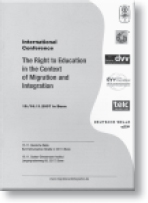International Conference in Bonn
The Right to Education in the Context of Migration and Integration
Statement and Report
More than two hundred participants from some fifty countries came together in Bonn from 15 to 16 No vember 2007 to share information and search for future ways to cooperate more closely through adult education in the complex and diverse field of migration and integration.
The main aim was to create a forum for the exchange of ideas and experiences about the challenges posed by migration to European and international coopera tion in the field of adult education, about their contribution to the development of civil societies, and about the process of integration in countries of immigration.
Organisers and Conference Context
The conference had as its main partners the International Council for Adult Educa tion (ICAE), the European Association for the Education of Adults (EAEA), and the German Adult Education Association (DVV), representing the global, European and national dimensions. The conference benefited from a wide range of sponsors, including German Ministries, and more especially TELC, the European Language Certificates company. The Deutsche Welle served as media partner. The conference was jointly planned and organized by DVV International.
Participants were drawn from a wide range of professional associations, non governmental and community-based organisations, government, and universities. Aspects of gender mainstreaming were strongly featured in the different thematic keynotes, forums, and workshops.
International participants particularly welcomed information on recent develop ments in adult education and integration policy and practice in Germany, covering a broad spectrum of social, cultural and educational issues. This led to the realisa tion that we all have to learn from each other: European and German participants also learnt much from the global perspectives introduced by colleagues from African, Asian and Latin American countries.
The presentation of different approaches to education in international coopera tion was intended to help change perceptions – so that migration is seen more as an opportunity than as a threat. As the Global Commission on International Migration has put it: it is a transnational phenomenon, and migration and integration must be regarded as two sides of the same coin. The impact of this on development aid and cooperation needs to be explored further.
The Right to Learn
Today's learning societies need lifelong learning, and they need structures to sup port informal, non-formal and formal learning, education and training throughout the life span, for children, younger and older adults. The diversity of adult educa tion cultures in the different countries and regions was recognised, and intercultural approaches to learning were discussed.
Participants analysed experiences in language learning in great detail. This was seen as a key to integration and participation. The assessment and testing of language competences was looked at as a criterion for immigration. Are the number and diversity of languages spoken by immigrants a potential or a threat? What can adult education do to enhance multilingual societies? And what can adult education do to open up receiving societies in intercultural terms?
A second forum considered the right to education, learning and training as a foundation for equal rights for migrants in integration and participation. The recog nition of migrants’ formal and non-formal qualifications in the host countries, and their further up-grading through lifelong learning for all, are of great importance. How can host countries acknowledge diversity and create space for political par ticipation by people with a migrant background? How can access, availability, acceptability and adaptability of education be guaranteed, especially for vulner able and silent groups such as migrant women and young refugees?
The forum on migration and development looked at the educational needs of migrants. What can adult education do before emigration, and after arrival in the new country? How can activities include all family members? Who are the important actors in this process? As one of the key aspects, the discussion centred around issues of brain drain, brain gain, and brain circulation – who gains from migration? On the other hand, there is clear evidence that the money transferred by migrants to their home countries exceeds the flow of development aid in many countries. Finally, in this forum, the educational needs created by internal migration were analysed.
The Way Ahead
In planning and implementing this event, the organisers took account of recent and forthcoming meetings of adult educators such as the DVV Berlin Convention "Learn Something New - Shape the Future - Bring People Together"in May 2006, the ICAE World Assembly on "Adults' Right to Learn: Convergence, Solidarity and Action" in January 2007, and the EAEA conference on "Equal Opportunities for All - the Value of Adult Learning Promoting Equality" in December 2007. Addition ally, they saw the conference as preparation for a major forthcoming event: the UNESCO International Conference on Adult Education, CONFINTEA VI, in 2009 in Brazil. Regional preparatory conferences are already planned for 2008, where issues of adult education in migration and integration will play an important role.
ICAE, EAEA and DVV, and the participants in this conference on migration and integration, will endeavour to ensure that the pressing and urgent issues of poverty reduction and social inclusion – and the crucial role adult education has to play in all these areas through civic education, skills training, literacy and basic education – are treated with more professionalism and solidarity in future. The conference strengthened the foundations for these activities. It increased capaci ties and the motivation of the participants to become further involved - and to involve others.
More information on the content and results of the conference can be found at www.migrationandintegration.de. The organisers are at www.icae.uy.org, www.eaea.org, www.dvv-vhs.de, www.telc.net. and www.dvv-international.de.
Source: Adult Education and Development, Number 70, 2007, pp. 9 - 12



